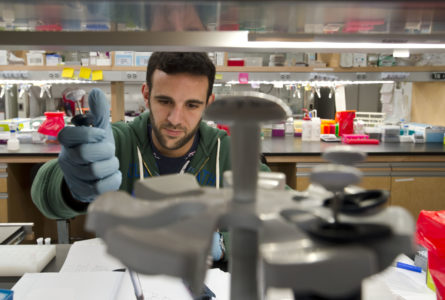Genetically engineered mosquitoes to eradicate disease
As scientists explore the potential application of gene editing, they’re beginning to discover the many uses — and pitfalls — of the technology. In the case of malaria and other vector-borne illnesses, it’s become clear that gene editing could be a powerful new tool for mosquito control and disease eradication. At a live panel recorded at The Forum at the Harvard T.H. Chan School of Public Health, four experts discussed gene editing and how it might influence global and human health.

Enzo Mameli, postdoctoral fellow, Catteruccia laboratory,
Harvard T.H. Chan School of Public Health.
Photo credit: Len Rubenstein
Through gene editing, scientists can change the DNA of a cell or organism. To do this, an enzyme slices the DNA at a specific targeted sequence, and during the repair of this break, desired edits can be introduced to the DNA. CRISPR, which stands for “Clustered Regularly Interspaced Short Palindromic Repeats,” is one such gene editing system that is proving to be incredibly accurate, efficient, and straight-forward to implement. CRISPR can not only enable scientists to make desired changes to the DNA, but it can also be harnessed to spread these desired genetic changes into whole wild populations.
At The Forum on “Gene Editing: Promises and Challenges,” panelist Flaminia Catteruccia, Associate Professor of Immunology and Infectious Diseases, Harvard T.H. Chan School of Public Health, explained that through technologies like CRISPR, “we can… spread the desired genetic traits into species that pose a threat for human health, such as mosquitos.”
This is an exciting potential benefit of gene editing that could have a lasting positive effect on communities affected by malaria. Catteruccia says, “How can we modify these mosquito populations? We can, for instance, provide them with factors that will kill malaria parasites so that those mosquitos will not be able to transmit those parasites from one person to the next. Or we can target the mosquitos themselves and introduce genetic traits that induce sterility, so that the reproductive output of those mosquitos would be reduced. Eventually, there would be fewer mosquitos that can transmit the disease and even mosquito populations can be eliminated from any given area.” However, there is the potential that releasing gene-altered mosquitos to mate with wild mosquitos would fail, as not all offspring of the mosquitos would carry the altered gene and eventually, the gene-altered mosquitos could go extinct, reversing the effort made by scientists.
At the Wyss Institute at Harvard Medical School, a team of researchers led by Dr Kevin Esvelt, now an Associate Professor at MIT Media Lab, and Andrea Smidler, a student in the PhD Program in Biological Sciences of Public Health at the Harvard Chan, are working to develop a process to mitigate this potential outcome. They hypothesize it is possible to use CRISPR to spread even potentially deleterious traits and genes into wild populations. This technology — termed gene drives — uses CRISPR to break the normal laws of inheritance to effectively guarantee desirable genetic modifications will be inherited in offspring, thereby eliminating the possibility of extinction and increasing the levels of beneficial gene-altered mosquitos.
Genetically modified mosquito releases have occurred in many parts of the world, like the Cayman Islands, Panama, Malaysia, and Brazil. In the Florida Keys, citizens of two counties even got to vote in favor of or against the release of gene-altered mosquitos in their area. Cars adorned with pro-mosquito and anti-mosquito bumper stickers graced city streets during the voting period as citizens voiced their opinions. Catteruccia says, “While residents in Monroe county voted in favor of these releases, residents in Key Haven, which was the location more closely affected by the releases, voted against.” This brings up an entirely new set of issues in the mosquito debate. “Who will have the final word in deciding whether this gene drive can be released? After all, mosquitos don’t stop at national borders so this would have to be an international decision.”
–Abbey Interrante, Communication and Outreach Coordinator
Harvard’s Defeating Malaria: From the Genes to the Globe initiative
To learn more about malaria eradication and gene editing, enroll today in MalariaX: Defeating Malaria from the Genes to the Globe.
